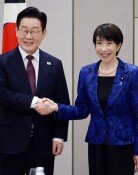Current Public Official Appointments Not Even Thinkable in Previous Governments
Current Public Official Appointments Not Even Thinkable in Previous Governments
Posted June. 24, 2005 05:54,
There have a series of appointments of political officials who used to hold high office either in Cheong Wa Dae or the ruling party as directors and auditors in public agencies under the umbrella of the government.
Of course there were not a few parachuted public officials in state-run enterprises. However, some point out that the severity of the problem has been higher since the inauguration of the current administration as officials who worked for Cheong Wa Dae or the ruling party with a lack of expertise are sent to various state-run enterprises en masse to an extent not even thinkable in previous governments.
CEOs with Lack of Expertise Appointed to Lead State-run Enterprises
On June 22, Cheong Wa Dae appointed Lee Cheol as president of the Korea Railroad Corporation (Korail), and the Uri Partys former Busan City regional office head Lee Hae-seong as president of the Korea Minting and Security Printing Corporation (KOMSCO). Both ran for office for the ruling Uri Party in Busan in vain in last years 17th general elections, and have a lack of experience with tasks related to public agencies.
Similarly, in April, Lee Woo-jae, the former executive advisor to the Uri Party was appointed president and CEO of the Korea Racing Association (KRA).
In addition, Lee Young-tak from North Gyeongsang Province in last years general elections was appointed chairman and CEO of the Korea Exchange (KRX). Moreover, the Korea National Housing Corporation (KNHC) had its new chairman, Hahn Haeng-soo who ran for office under the proportional representative system. All these show the ruling partys officials have been selected for main posts en masse including presidents and auditors in various state-run enterprises and organizations since President Roh came into office.
There has been an increase of eight people appointed as CEOs of state-run enterprises who were left out in the general elections as Uri Party candidates last year.
Cheong Wa Dae explained the appointment of presidents of both Korail and KOMSCO, saying, They were selected in consideration of their overall capabilities, including organizational skills and know-how in negotiating with labor unions, instead of their professional expertise.
However, economics professor Ahn Jae-wook at Kyunghee University pointed out that parachuted officials with a lack of expertise greatly lower corporate efficiency, adding, There are always parachuted officials because rulers intend to appoint their aides for core positions in order to maximize his power.
Lack of Management Disguised as Open Appointment System-
A Mr. Choi (68), who was retired from working as a high official, has always been left off of the list for open appointments of CEOs for public agencies since last year. Choi said, I used to get calls from the CEO Nomination Committee to send my resume prior to the opening, but there was zero chance for me in the first place, adding, I will no longer play a mere peripheral role.
One official who chose to apply to the KRA in vain even argued against the Ministry of Agriculture, saying, The selection process was not fair.
The Problem Is with the Mindset, Not the System
Experts think the mindset of decision makers is more problematic than the human resources system of state-run enterprises.
The CEO Nomination Committee of non-permanent executive directors and private members recommend appropriate candidates based on the open appointment system, and responsible ministers officially request for due appointments. This process is not much different from advanced countries in terms of selecting officials, such as in the U.S. and Britain. Nevertheless, the whole situation differs in what they are doing.
Oh Yeol-geun, professor of Public Administration at Dankook University, said, If there is the mindset to pay back those one owes among top decision makers in selecting officials, a personnel system cannot work no matter how good it is.
Ki-Jeong Ko legman@donga.com koh@donga.com




![[속보]美 “미국인은 이란 당장 떠나라” 대사관 긴급 공지](https://dimg.donga.com/c/138/175/90/1/wps/NEWS/IMAGE/2026/01/13/133147285.1.jpg)


